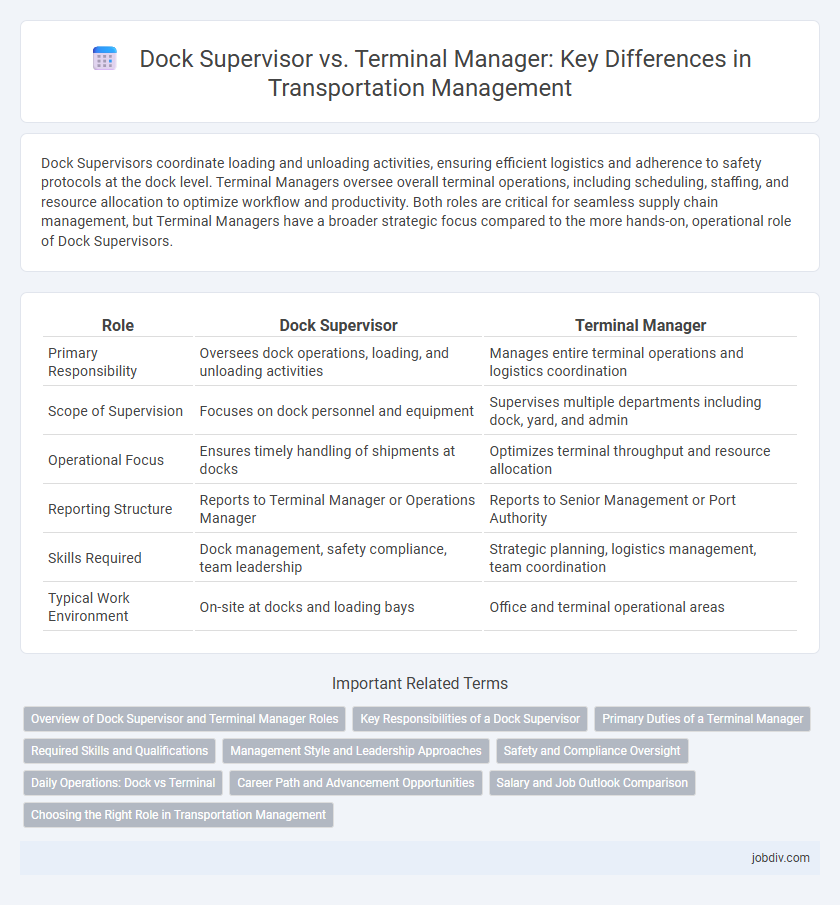Dock Supervisors coordinate loading and unloading activities, ensuring efficient logistics and adherence to safety protocols at the dock level. Terminal Managers oversee overall terminal operations, including scheduling, staffing, and resource allocation to optimize workflow and productivity. Both roles are critical for seamless supply chain management, but Terminal Managers have a broader strategic focus compared to the more hands-on, operational role of Dock Supervisors.
Table of Comparison
| Role | Dock Supervisor | Terminal Manager |
|---|---|---|
| Primary Responsibility | Oversees dock operations, loading, and unloading activities | Manages entire terminal operations and logistics coordination |
| Scope of Supervision | Focuses on dock personnel and equipment | Supervises multiple departments including dock, yard, and admin |
| Operational Focus | Ensures timely handling of shipments at docks | Optimizes terminal throughput and resource allocation |
| Reporting Structure | Reports to Terminal Manager or Operations Manager | Reports to Senior Management or Port Authority |
| Skills Required | Dock management, safety compliance, team leadership | Strategic planning, logistics management, team coordination |
| Typical Work Environment | On-site at docks and loading bays | Office and terminal operational areas |
Overview of Dock Supervisor and Terminal Manager Roles
Dock Supervisors oversee the daily loading and unloading operations at shipping docks, ensuring safety protocols and timely cargo handling while coordinating dock workers and equipment. Terminal Managers are responsible for the overall management of transportation terminals, including operational efficiency, staff supervision, and logistics coordination for inbound and outbound shipments. Both roles demand strong leadership and organizational skills, but the Terminal Manager holds broader strategic and administrative responsibilities compared to the more task-focused Dock Supervisor.
Key Responsibilities of a Dock Supervisor
A Dock Supervisor oversees daily loading and unloading operations, ensuring efficient cargo handling and adherence to safety protocols. They coordinate with warehouse staff and trucking companies to streamline shipment schedules and minimize delays. Managing equipment maintenance and supervising dock workers are also critical responsibilities to maintain operational flow.
Primary Duties of a Terminal Manager
Terminal Managers oversee the entire terminal operations, ensuring efficient cargo handling, storage, and distribution processes align with safety and regulatory standards. They coordinate with dock supervisors to optimize workflows, manage staffing schedules, and maintain equipment functionality to prevent delays. Their primary duties also include strategic planning, budget management, and compliance monitoring to enhance terminal productivity and customer satisfaction.
Required Skills and Qualifications
Dock Supervisors require strong organizational skills, expertise in inventory management, and proficiency in safety protocols to oversee loading and unloading operations efficiently. Terminal Managers demand advanced leadership abilities, comprehensive knowledge of logistics and supply chain processes, and experience in regulatory compliance to manage terminal activities and coordinate between multiple departments. Both roles emphasize communication skills and the capacity to handle high-pressure environments in transportation hubs.
Management Style and Leadership Approaches
Dock Supervisors typically adopt hands-on management styles, directly overseeing loading and unloading operations while ensuring safety protocols are followed. Terminal Managers employ strategic leadership approaches that involve coordinating multiple departments, optimizing workflow, and driving long-term efficiency improvements across the entire terminal. Both roles require strong communication skills, but Terminal Managers focus more on high-level decision-making and resource allocation.
Safety and Compliance Oversight
Dock Supervisors manage daily operations on loading docks with a primary focus on enforcing safety protocols and ensuring compliance with OSHA regulations to prevent workplace injuries. Terminal Managers oversee broader terminal operations, integrating comprehensive safety programs and regulatory compliance across multiple departments, including environmental standards and hazardous material handling. Both roles require rigorous monitoring of safety audits and employee training to maintain adherence to federal and state transportation compliance laws.
Daily Operations: Dock vs Terminal
A Dock Supervisor oversees daily dock operations, managing loading, unloading, and coordinating with warehouse staff to ensure efficient cargo handling. A Terminal Manager handles broader terminal activities, including yard management, gate operations, and scheduling to maintain smooth traffic flow and overall terminal productivity. The Dock Supervisor's focus is on immediate dock area tasks, while the Terminal Manager ensures the integration of all terminal functions for optimal throughput.
Career Path and Advancement Opportunities
Dock Supervisors typically oversee daily loading and unloading operations, gaining hands-on experience crucial for advancing to Terminal Manager roles. Terminal Managers hold broader responsibilities, including facility management and coordination of transportation logistics, positioning them for senior leadership or operations director roles. Career advancement from Dock Supervisor to Terminal Manager involves developing skills in strategic planning, team leadership, and regulatory compliance within transportation hubs.
Salary and Job Outlook Comparison
Dock Supervisors typically earn an average salary ranging from $45,000 to $60,000 annually, while Terminal Managers command higher pay, often between $65,000 and $90,000 due to greater responsibilities in overseeing terminal operations. Job outlook for both roles remains positive, with the Bureau of Labor Statistics projecting a 5-7% growth in transportation and logistics management positions over the next decade. Terminal Managers enjoy stronger advancement opportunities and higher demand in large-scale shipping hubs compared to Dock Supervisors, whose roles are more focused on daily dock activities and personnel management.
Choosing the Right Role in Transportation Management
A Dock Supervisor primarily oversees loading and unloading operations, ensuring efficient workflow and safety compliance at the dock level, while a Terminal Manager handles overall terminal operations, including scheduling, staffing, and logistics coordination. Choosing the right role depends on your expertise in hands-on operational control versus strategic management of transportation hubs. Companies in freight, shipping, and logistics prioritize Dock Supervisors for tactical task supervision and Terminal Managers for optimizing terminal performance and customer satisfaction.
Dock Supervisor vs Terminal Manager Infographic

 jobdiv.com
jobdiv.com